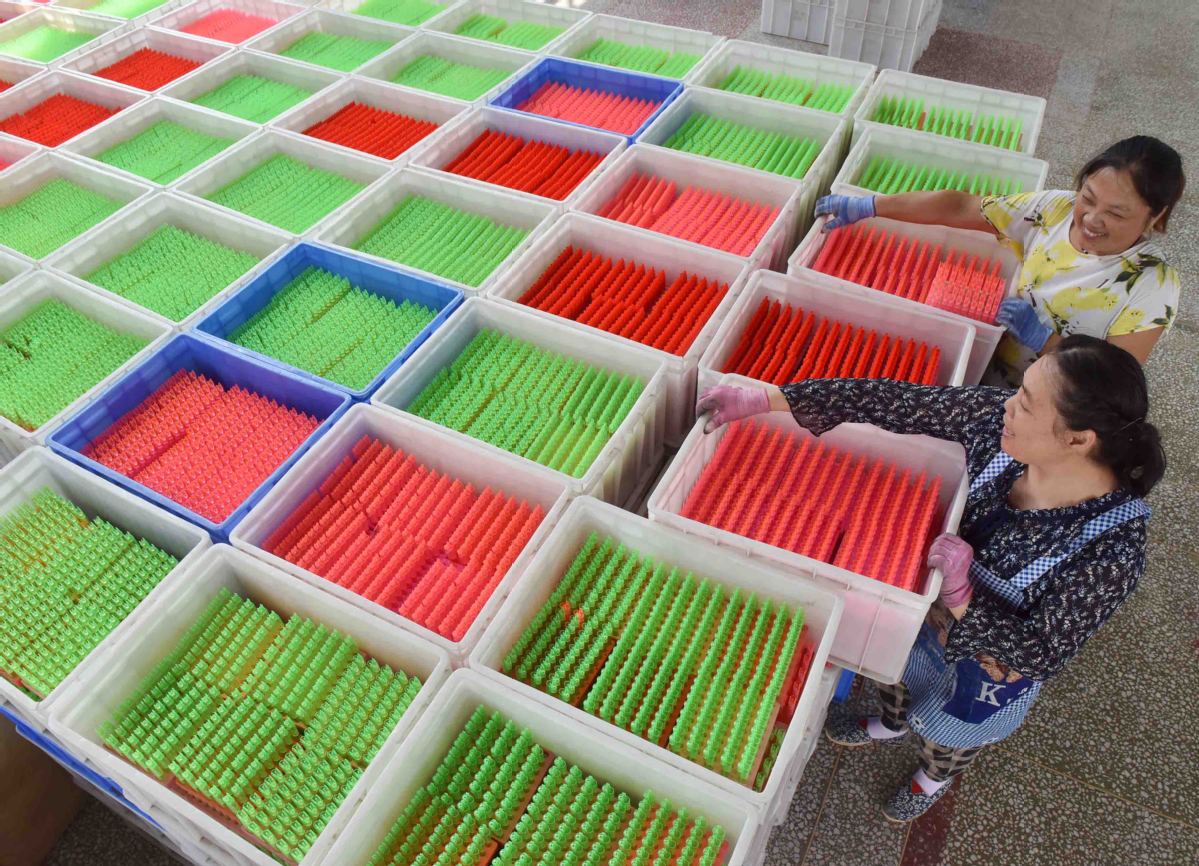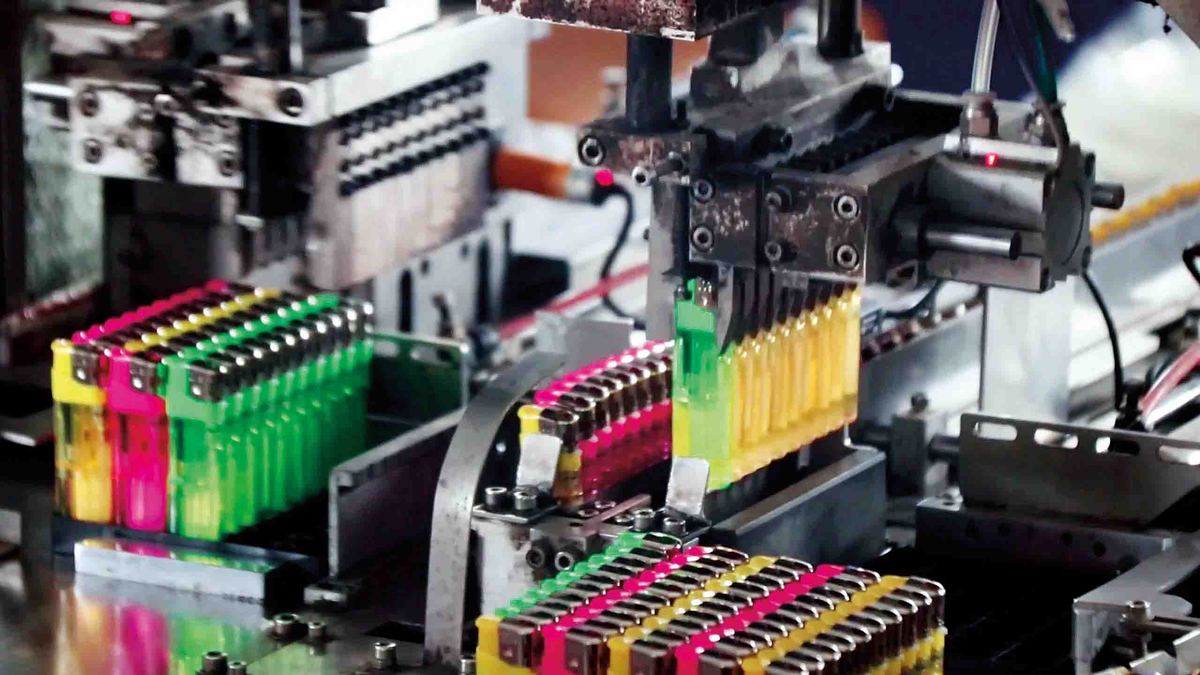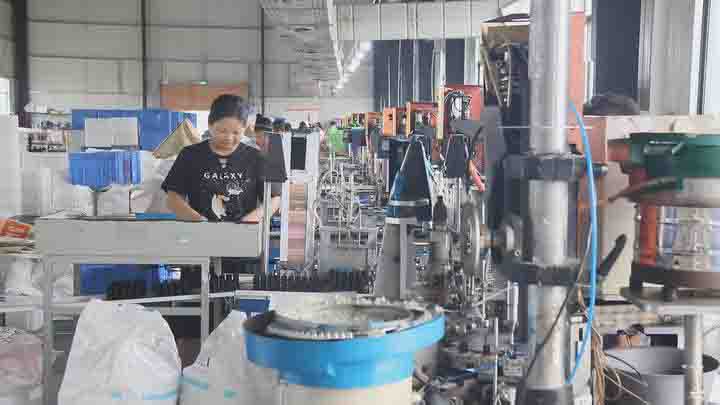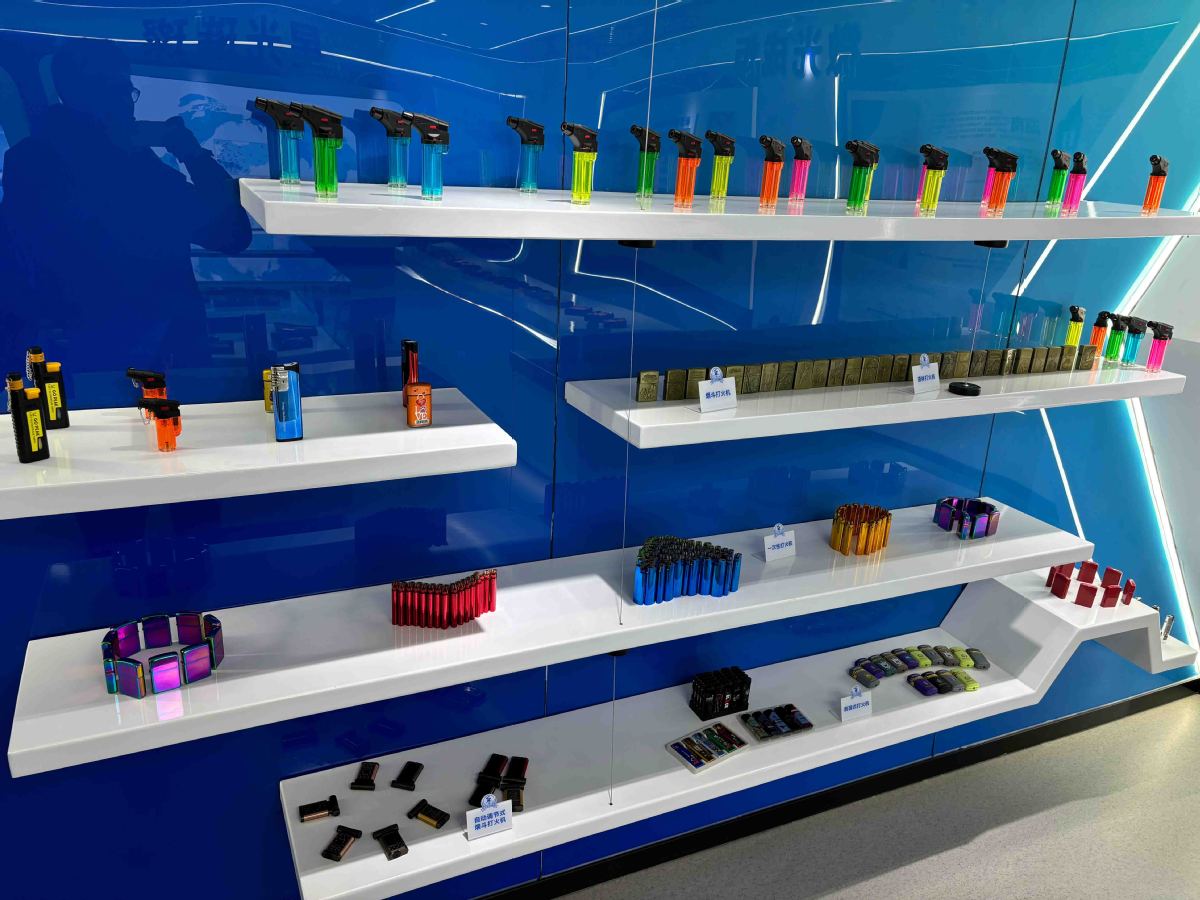Editor's Note: In a series of reports titled "Claims to Fame", China Daily looks at how some regions have earned wealth and recognition through specific products to realize the goal of rural vitalization. Each year, around 20 billion lighters are sold around the world and 75 percent of them are made in Shaodong, Hunan province. The lighters are sold to 120 countries and regions. If they were connected end-to-end, the chain could encircle the Earth more than 30 times, one industry expert said. Over the years, the lighter companies in Shaodong have grown bigger and more automated, with their products and the industry upgrading constantly. However, what has remained unchanged for 20 years is the price of the disposable lighters. They are almost always sold at 1 yuan ($0.14) each by retail stores, meaning the manufacturers can still make a profit despite inflation and rising costs. Shaodong is a hilly region with only around 10 percent of flat land. The lack of arable land prompted local people to find other ways to make a living. After the reform and opening-up policy was introduced in 1978, Shaodong people ventured into trading businesses, selling different types of small merchandise to customers around the country. In 2022, Shaodong was ranked 92 among more than 2,844 county-level regions in the country in terms of manufacturing prowess. Lighters are the pillar industry of Shaodong, employing more than 80,000 people, roughly 7.6 percent of the total local population. Bai Jiabao, deputy general manager of Hunan Dongyi Electric Share Co, the largest lighter manufacturer in Shaodong, said the company started making lighters in 1994. Today, it can produce 12 to 13 million lighters per day of more than 200 types. The lighters are sold for prices ranging from 0.3 yuan to 30 yuan each. More than 80 percent of its lighters are exported overseas to over 100 countries and regions, he said. Although the profit made from each lighter is low, the company can still make money and stay competitive through investing in automation and upgrading the supply chain, he said. While its cheapest lighters are sold for 0.3 yuan each, Bai said the company can make about 10 percent profit thanks to the use of automation. The company started to invest in automation in 2013 and has spent around 60 to 70 million yuan in research and development in the sector. The use of automation has helped Hunan Dongyi Electric Share increase its production capacity 20-fold, Bai said. While it used to employ more than 4,000 people to make around 1 million lighters a day, it now can produce more than 10 million with half the number of employees, he said. "As a cheap and convenient source for fire, lighters cannot be replaced by any other tools and I am proud to work in this industry," Bai said. Lighting the spark Lighters were first manufactured in Zhejiang and Guangdong provinces in the 1980s, with Zhejiang's Wenzhou a major production hub. However, in the late 1990s and early 2000s, the production line was transferred to central regions due to the rising cost of labor in coastal areas, and Shaodong seized the opportunity to become a leading production base. Fu Zaihua and her husband Yao Hanyun were among the first people in Shaodong to work in the industry. In 1992, a friend told them that lighter manufacturing was a big business and the couple went to a factory in Guangdong province to try and learn the techniques. However, they were only given a limited time during the visit to observe the manufacturing process, and did not learn much. "We bought 50 lighters and started to dismantle and reassemble them repeatedly, trying to learn the skills by ourselves," Fu said. Later, they bought 100,000 lighter parts and began their own business venture at home. Their company, Shunfa Manufacturing Corp, was also the first one in Shaodong to sell lighters to an overseas client who was from Indonesia. While cheap disposable lighters are still one of the company's bestselling items, it has put great effort and innovation into producing more high-end products and diversifying its business portfolio. Automation has also greatly improved efficiency, so that more lighters can be produced with fewer employees. Even though workers' salaries have increased, costs can remain low, so the company's products are still competitive. Fu said they have been through much hardship in the expansion and running of the business. There were difficulties in almost every sector, from getting funds to finding the right staff and obtaining technology, she said. However, they were determined, and persevered. "I made a decision back then that I intended to follow through," she said. "Shaodong people are known to be hardworking and tenacious, that's the secret of our success." Other locals were quick to follow their lead and numerous small lighter manufacturing factories opened in Shaodong. To prevent hostile competition and boost cooperation, in 2002, the Shaodong Lighter Industry Association was established. Ouyang Zhen, vice mayor of Shaodong, said the association publishes price guides for lighters and consolidates resources for the industry to avoid price wars among different enterprises, and to maintain sound market development. The association also has a database on new products. When an enterprise makes a new product, it needs to provide samples to the association for its records. If the new product is similar to an existing one it will be sent back to the enterprise, he said. There are 114 lighter companies in the county. Twenty-seven are lighter manufacturers while the remainder produce materials for lighter production. Ouyang said the companies can produce more than 200 components for lighters and all their factories can be reached in a short time. Diversifying products To diversify Shaodong lighter products, the local government established a research institute in 2017. The institute has conducted technological research on common issues, developed more than 30 new pieces of equipment and products, and obtained 276 intellectual property and 47 invention property patents, according to the local government. The county now has more than 1,000 researchers working in the lighter industry and spends around 200 million yuan in research and development annually, with 38 percent of its products updated every year, Ouyang said. The development of the industry has also ensured that local people can find jobs near their homes without needing to migrate to big cities for work. Wang Jianing, a sales representative for Dongyi, remembers clearly her first order 13 years ago when she sold 6.6 million lighters worth $500,000 to Bangladesh clients. Now she can sell more than 300 million lighters a year, an "enormous and daunting" number that she takes great pride in. She graduated from a university in Guangzhou, Guangdong, after majoring in bioengineering, and returned to her hometown to work as a sales representative dealing with foreign clients. At the start, her base salary was 1,800 yuan per month. She did not make any sales in the first three months and thought about quitting. But the Bangladesh deal, which landed her a 6,000 yuan bonus, gave her an incentive to stay. After that, she rarely took a break from her job and even worked at the weekend. She paid close attention to her clients' needs and due to time zone differences often worked very late. She quickly got better at her job, and in her third year became the company's best salesperson. "Diligence is the key. I usually start working at 8 am and return to the dormitory around midnight," she said. She learned sales skills from scratch and also worked hard to improve her English proficiency. "Lighters are a necessity for people. Our products are sold all over the world," she said. Even during the COVID-19 pandemic, the lighter business did not take a hit, as people stuck at home tended to smoke more, she said. The key to cultivating clients is to treat them with sincerity and respect. Salespeople need to choose the products best suited for their clients based on their conditions, personality, background and market, she said. "You can be friends with your clients, talk with them regularly, bring the relationship closer, but the key is that it should be a love-hate relationship," she said. "Your clients need to feel they cannot leave, but they are also displeased they cannot get a better offer from you." Exports growth The large amount of exports has prompted customs authorities to keep a close eye on the quality of the products. At Shaoyang Customs, inspections of lighters make up a large portion of officers' daily work. At the customs office, an exhibition details the development of Shaodong's lighter industry and showcases different lighters made by local companies. Since 2001, customs authorities have been required to conduct mandatory checks on all exported lighters to ensure their quality. Last year, Shaoyang Customs handled 3,500 batches of lighter exports. Shaodong is under the administration of Shaoyang. The quality of lighters is tested and each batch goes through rigorous checks, said Wang Peng, an official with Shaoyang Customs. The checks include 12 steps to make sure the lighters function properly in different circumstances, Wang said. A test lighter, for example, is dropped from a height of 1.5 meters in three different positions. To pass the inspection it must stay intact and have no gas leakage. The lighters are also put in containers set at 65 C for four hours to make sure they are resistant to high temperatures. Last year, lighters worth 3.74 billion yuan in total were exported from Shaodong, accounting for half of China's lighter exports, according to Shaoyang Customers. While the majority are budget-friendly disposable lighters, there is a growing portion of high-end ones. Customs data shows that the total export volume to Europe and North America increased steadily from 290 million yuan in 2020 to more than 500 million yuan last year. Ouyang said that international business and branding strategies have become competitive strengths for Shaodong lighter companies. It is also important to push for high-quality development of the enterprises. In the future, the core competitive strength of lighter companies will grow and they will continue to make an impact in the international market, he added.




Lighter hub shines as world leader in production
Editor:谭婕倪
Source:chinadaily
Updated:2024-12-12 16:54:05
Source:chinadaily
Updated:2024-12-12 16:54:05
Special
Contact
Welcome to English Channel! Any suggestion, welcome.Tel:0731-82965627
lisl@rednet.cn
zhouqian@rednet.cn











